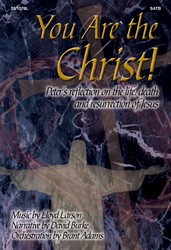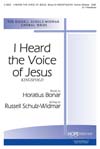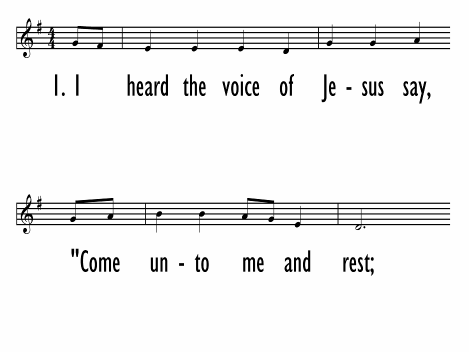- |
User Links
I Heard the Voice of Jesus Say

I heard the voice of Jesus say, "Come unto Me and rest"
Author: Horatius Bonar (1846)Published in 1252 hymnals
Printable scores: PDF, MusicXMLPlayable presentation: Lyrics only, lyrics + musicAudio files: MIDI, Recording
Representative Text
1. I heard the voice of Jesus say,
“Come unto Me and rest;
Lay down, O weary one, lay down
Thy head upon My breast.”
I came to Jesus as I was,
Weary, and worn, and sad;
I found in him a resting-place,
And he has made me glad.
2. I heard the voice of Jesus say,
“Behold, I freely give
The living water; thirsty one,
Stoop down, and drink, and live.”
I came to Jesus, and I drank
Of that life-giving stream;
My thirst was quench'd, my soul revived,
And now I live in him.
3. I heard the voice of Jesus say,
“I am this dark world’s Light;
Look unto me, your morn shall rise,
And all your day be bright.”
I looked to Jesus, and I found
In him my Star, my Sun;
And in that Light of life I’ll walk,
Till trav'ling days are done.
Source: Hymns and Devotions for Daily Worship #219
Author: Horatius Bonar
 Horatius Bonar was born at Edinburgh, in 1808. His education was obtained at the High School, and the University of his native city. He was ordained to the ministry, in 1837, and since then has been pastor at Kelso. In 1843, he joined the Free Church of Scotland. His reputation as a religious writer was first gained on the publication of the "Kelso Tracts," of which he was the author. He has also written many other prose works, some of which have had a very large circulation. Nor is he less favorably known as a religious poet and hymn-writer. The three series of "Hymns of Faith and Hope," have passed through several editions.
--Annotations of the Hymnal, Charles Hutchins, M.A. 1872… Go to person page >
Horatius Bonar was born at Edinburgh, in 1808. His education was obtained at the High School, and the University of his native city. He was ordained to the ministry, in 1837, and since then has been pastor at Kelso. In 1843, he joined the Free Church of Scotland. His reputation as a religious writer was first gained on the publication of the "Kelso Tracts," of which he was the author. He has also written many other prose works, some of which have had a very large circulation. Nor is he less favorably known as a religious poet and hymn-writer. The three series of "Hymns of Faith and Hope," have passed through several editions.
--Annotations of the Hymnal, Charles Hutchins, M.A. 1872… Go to person page >Text Information
Related Texts
| First Line: | I heard the voice of Jesus say, "Come unto Me and rest" |
| Title: | I Heard the Voice of Jesus Say |
| Author: | Horatius Bonar (1846) |
| Meter: | 8.6.8.6 D |
| Place of Origin: | Scotland |
| Language: | English |
| Notes: | Arabic translations: "صوت يسوع الحلو قد", "صوتُ يسوعَ قائلٌ" by فريد عوده; German translation: "Ich horte aus dem Hielands Mund" by Karl Keck, "Ich horte Jesu Freundesruf" by Ernst Gebhardt, "Ich horte meines Heilands Wort" by C. F. Paulus; Hawaiian translation: "Ua lohe au iko Iesu hea" by Hualalai; Portuguese translation: "Ouvi o Salvador dizer, vem descansar em mim" by H. Mary Wardlaw; Spanish translation: See "Oí la voz del Salvador" by Anonymous; Swedish translation: "Jog hörde Jesu röst så ljuf" |
| Copyright: | Public Domain |
- (hymns)
- (hymns)
- (hymns)
- (hymns)
- (hymns)
- (hymns)
- (hymns)
- (hymns)
- (hymns)
- (hymns)
- (hymns)
- (hymns)
- (hymns)
- (hymns)
- (hymns)
- (hymns)
- (hymns)
- (hymns)
- (hymns)
- (hymns)
- (hymns)
- (hymns)
- (hymns)
- (hymns)
- (hymns)
- (hymns)
- (hymns)
- (hymns)
- (hymns)
- (hymns)
- (hymns)
- (hymns)
- (hymns)
- (hymns)
- (hymns)
- (hymns)
- (hymns)
- (hymns)
- (hymns)
- (hymns)
- (hymns)
- (hymns)
- Year A, Epiphany season, Third Sunday
Related to Isaiah 9, Psalm 27 and Matthew 4 (National Association of Pastoral Musicians) - Year A, Lent, Third Sunday
Related to John 4 (National Association of Pastoral Musicians) - Year A, Lent, Third Sunday
This is recommended for Year A, Lent, Third Sunday by 2 hymnal lectionary indexes. - Year A, Lent, Fourth Sunday
Related to John 9 (National Association of Pastoral Musicians) - Year A, Ordinary Time, Proper 9 (14)
- Year A, Ordinary Time, Proper 9 (14)
This is recommended for Year A, Ordinary Time, Proper 9 (14) by 4 hymnal lectionary indexes including Glory to God: the Presbyterian Hymnal #182 and Lift Up Your Hearts: psalms, hymns, and spiritual songs #665. - Year B, Holy Week season, Tuesday of Holy Week
- Year C, Ordinary Time, Proper 6 (11)
- Year C, Ordinary Time, Proper 6 (11)
This is recommended for Year C, Ordinary Time, Proper 6 (11) by 3 hymnal lectionary indexes including Glory to God: the Presbyterian Hymnal #182.
Chinese
English
- A Book of Song and Service: for Sunday school and home #110
- A Book of Worship for the Use of the Evangelical Lutheran Church ... of the Church of the Redeemer, Richmond, Virginia #d61
- A Collection of Familiar and Original Hymns and Tunes #d42
- A Collection of Familiar and Original Hymns with New Meanings. 2nd ed. #50
- A Companion to the Canadian Sunday School Harp: being a selection of hymns set to music, for Sunday schools and the social circle #154
- A Handy Book of Old and Familiar Hymns #133
- A Manual of Devotion and Hymns for the House of Refuge, City of New York #197
- A Manual of Worship: for the chapel of Girard College #87
- A Missionary Hymn Book #187
- A New Hymnal for Colleges and Schools #483 10 shown out of 898
Latin
Spanish
Welsh
- Cân a Mawl: llyfr hymna a thonau Methodistiaid Calfinaidd Unol Dalaethau yr America=Song and Praise: the hymnal of the Calvinistic Methodist Church of the United States of America #65
- Mawl a chân = praise and song : llyfr hymnau a thonau i Gymru ar Wasgar = hymnal for Welsh and English church worship / crynhoad pwyllgor Eglwys Gymraeg, Detroit, Michigan #78
Notes
Despite his intimidating name and physical appearance, Horatius Bonar (1808-89) was a great lover of children and was concerned about how little the children understood of the metrical Psalms that were sung in the Scottish church of his day. "I Heard the Voice of Jesus Say" was one of the over 600 hymns he wrote to address the needs of the churches he served. Interestingly, John B. Dykes (composer of "Holy, Holy, Holy" and "Jesus, the Very Thought of Thee") uses the somber key of G minor to present Jesus' invitation to our weary, thirsty and dark souls in the first half of each verse; in the second half of each verse when the invitation has been accepted and the soul satisfied, Dykes uses the happier key of G major. Take some time to read Jesus' invitations to you as recorded in the Gospels and reflect on your response to Him: Matthew 11:28; John 4:10, 13-14; John 8:12. --Greg Scheer, 1996
========================
I heard the voice of Jesus say. H. Bonar. [Christ's Invitation.] Written at Kelso, and published in his Hymns Original and Selected, 1846, and in the 1st series of his Hymns of Faith & Hope, 1857, in 3 stanzas of 8 lines, and headed, “The Voice from Galilee." It has come into extensive use, and is one of the most popular of the author's hymns. It is often used in Home Mission Services, and is suited thereto. It has been rendered into Latin by Dr. Macgill in his Songs of the Christian Creed and Life, 1876, as “Loquentem exaudivi."
--John Julian, Dictionary of Hymnology (1907)
Access an additional article on the Canterbury Dictionary of Hymnology:
Timeline
Arrangements
Media
- MIDI file from The Bright Array #45
- MIDI file from Baptist Hymnal 1991 #551
- MIDI file from Baptist Hymnal 1991 #551
- Audio recording from Celebrating Grace Hymnal #577
- MIDI file from The Cyber Hymnal #2816
- Audio recording from Evangelical Lutheran Worship #332
- Audio recording from Evangelical Lutheran Worship #611
- Audio recording from Gather Comprehensive #646
- MIDI file from Gloria Deo: a Collection of Hymns and Tunes for Public Worship in all Departments of the Church #219
- Audio recording from Glory to God: the Presbyterian Hymnal #182
- MIDI file from Gospel Praise Book.: a collection of choice gems of sacred song suitable for church service, gospel praise meetings, and family devotions. (Complete ed.) #123
- MIDI file from Give Thanks and Sing: for use in all religious meetings #106
- MIDI file from Good Will: A collection of New Music for Sabbath Schools and Gospel Meetings (Enlarged) #23
- MIDI file from Inspiring Songs No. 1: for the Sunday school #13
- MIDI file from The Kingdom of Praise #79
- Audio recording from Lift Up Your Hearts: psalms, hymns, and spiritual songs #665
- Audio recording from The New Century Hymnal #489
- Audio recording from Oramos Cantando = We Pray In Song #593
- MIDI file from Psalter Hymnal (Gray) #488
- MIDI file from Psalter Hymnal (Gray) #488
- MIDI file from Redemption Songs #49
- Audio recording from Trinity Hymnal (Rev. ed.) #304
- MIDI file from Tabernacle Hymns: No. 2 #127
- MIDI file from Triumphant Songs No.2 #54
- Audio recording from The Worshiping Church #506
- MIDI file from Worship in Song: A Friends Hymnal #124
- Audio recording from Worship (4th ed.) #707


 My Starred Hymns
My Starred Hymns





